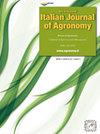Stability analyses of sunflower (Helianthus annuus L.) hybrids for oleic acid and yield traits under multi location trials in Pakistan
IF 2.1
3区 农林科学
Q1 AGRONOMY
引用次数: 0
Abstract
The development of a hybrid with high oleic acid is an important breeding goal for sunflower. High oleic acid sunflower has better cooking quality due to low oxidation and rancidity. Hence, inbred lines differing for oleic acid content were selected, alongside the development of hybrids where one or both parents exhibited high oleic acid content in edible oil, and then evaluated at various sites (i.e. with comparatively low temperature during sunflower reproductive phase at Sargodha and Faisalabad; while high temperature and low humidity at Bhawalpur and Multan) in Pakistan during spring season. Moreover, autumn season was relatively cool and high humid for sites (Faisalabad and Sargodha, Pakistan). DNA profiling of hybrids differing for oleic acid content using N1-3F/N2-1R confirmed the presence of a high oleic acid allele in the hybrids. Oleic acid content and seed yield components were increased at high temperature and low humidity to a greater extent in spring than in autumn season. Among the hybrids, one (H5) had stable high oleic acid content during the spring season with higher seed yield and kernel to seed percentage than the check cultivars (Hysun-33 and FH-331). Analysis of the combining ability of two locations revealed a relationship between mean oleic acid contents and combining ability, thereby suggesting the effectiveness of selection in developing high oleic acid inbred lines. Newly developed inbred C.112.P was a positive combiner for oleic acid at all sites except Sargodha, while restorer populations such as RH.344, RH.345 and RH.347 were positive male combiners.巴基斯坦向日葵(Helianthus annuus L.)杂交种油酸稳定性及产量性状多地试验分析
培育高油酸杂交种是向日葵育种的重要目标。高油酸向日葵因其低氧化、低酸败而具有较好的蒸煮品质。因此,选择油酸含量不同的自交系,同时开发一个或两个亲本在食用油中油酸含量高的杂交种,然后在不同的地点进行评估(即在萨戈达和费萨拉巴德的向日葵繁殖期相对较低的温度;而巴基斯坦的巴瓦尔布尔和木尔坦则在春季高温低湿。此外,秋季相对凉爽和高湿的站点(巴基斯坦的费萨拉巴德和萨戈达)。利用N1-3F/N2-1R对油酸含量不同的杂交种进行DNA分析,证实在杂交种中存在一个高油酸等位基因。在高温低湿条件下,油酸含量和籽粒产量各组分在春季的增加幅度大于秋季。其中,H5在春季油酸含量稳定较高,籽粒产量和粒粒率均高于对照品种(h孙-33和FH-331)。两个位点的配合力分析揭示了平均油酸含量与配合力之间的关系,从而提示了选择在培育高油酸自交系中的有效性。新发展的近交系C.112。除Sargodha外,P为油酸阳性组合,而RH.344、RH.345和RH.347为雄性阳性组合。
本文章由计算机程序翻译,如有差异,请以英文原文为准。
求助全文
约1分钟内获得全文
求助全文
来源期刊

Italian Journal of Agronomy
AGRONOMY-
CiteScore
4.20
自引率
4.50%
发文量
25
审稿时长
10 weeks
期刊介绍:
The Italian Journal of Agronomy (IJA) is the official journal of the Italian Society for Agronomy. It publishes quarterly original articles and reviews reporting experimental and theoretical contributions to agronomy and crop science, with main emphasis on original articles from Italy and countries having similar agricultural conditions. The journal deals with all aspects of Agricultural and Environmental Sciences, the interactions between cropping systems and sustainable development. Multidisciplinary articles that bridge agronomy with ecology, environmental and social sciences are also welcome.
 求助内容:
求助内容: 应助结果提醒方式:
应助结果提醒方式:


